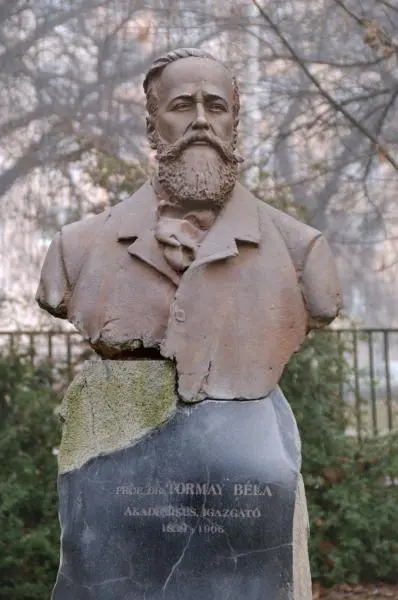 Tormay Béla Tolna megyében, Szekszárdon született 1838. október 23-án, ezt a szekszárdi római katolikus egyház által kiadott születési anyakönyvi kivonat bizonyítja. Itt egy félreértést kell eloszlatni, ugyanis még a lexikonok is 1939. október 10-ét említik születési dátumként. Édesapja Krenmüller Károly vármegyei tiszti fogorvos és a szekszárdi kórház igazgató fogorvosa volt. 1848-ban az Egészségügyi Minisztériumban osztálytanácsossá nevezték ki, ezért Pestre költözött, a család nevét ekkor magyarosította Tormayra.
Tormay Béla Tolna megyében, Szekszárdon született 1838. október 23-án, ezt a szekszárdi római katolikus egyház által kiadott születési anyakönyvi kivonat bizonyítja. Itt egy félreértést kell eloszlatni, ugyanis még a lexikonok is 1939. október 10-ét említik születési dátumként. Édesapja Krenmüller Károly vármegyei tiszti fogorvos és a szekszárdi kórház igazgató fogorvosa volt. 1848-ban az Egészségügyi Minisztériumban osztálytanácsossá nevezték ki, ezért Pestre költözött, a család nevét ekkor magyarosította Tormayra.
Iskolai tanulmányait abbahagyva 1854-55-ben kilenc hónapig dolgozott munkásként az óbudai hajógyárban a gépészeti osztályon. 1855 májusától Vidats István Gazdasági Gép- és Eszközgyárában rajzolással, mintázással és gépek összeállításával foglalkozott. Még ez év őszétől, egy éven át Széchenyi István cenki uradalmában dolgozott, mint gazdasági gyakornok. Itt szerette meg a földet, és itt került közel az állattartás- és tenyésztés szépségeihez. 1856-ban került a Károlyiak derekegyházi uradalmába, ahol ellenıri tisztként alkalmazták. Derekegyháza akkor még nagy terjedelmő puszta volt, ahol az uradalmi ellenır sokat érintkezett a néppel és itt sajátította el Tormay a népies nyelvezetet, melynek ismerete nagyban elısegítette, hogy a nép számára írott gazdasági könyvei széles körben terjedtek el és közkedveltté váltak. Derekegyházán különösen a juhtenyésztés és gyapjú ismerete iránt érdeklődött. 1858-ban a Pesti Állatgyógyintézet hallgatója lett. Tormay 1860-ben szerzett állatorvosi oklevelet. Ezzel párhuzamosan az orvosi egyetemen vegytant, bonc- és élettant hallgatott. Elméleti ismeretének jobb megalapozása és látókörének szélesítése végett 1860 őszén külföldi tanulmányútra ment, és tenyészeteket látogatott meg Auspachban, Allgauban és Warthenbergben. Majd Weihenstephanban (Bajorország) a felsıbb gazdasági intézetben bővítette tovább mezıgazdasági szakismereteit.
Hazatérve 1861-ben a pesti Állatgyógyintézet bonctani tanszékéhez nevezték ki tanársegédnek. A következı évben szabadságot kért, és ismét utazást tett, melynek állomásai: Németország, Franciaország, Anglia, Belgium, Hollandia, Holstein, Schelswig és Mecklenburg voltak. Itt nevezetesebb méneseket, szarvasmarha tenyészeteket, juhászatokat és gazdasági intézményeket szemlélt meg. Külföldön tett tanulmányai, ott szerzett tapasztalatai hozzásegítették a jóval késıbb beinduló tenyészállat-import szervezéséhez, vezetéséhez. Tanulmányútjáról visszatérve még két évet töltött el a Pesti Állatgyógyintézetben, ezt követıen másfél évig birtokrendezéssel foglalkozott nádudvari birtokán. Itt régi vágyának megfelelıen a gazdálkodásnak óhajtott élni. Egy esztendı elteltével azonban le kellett mondania errıl a szép tervérıl, mert az akkor még vízjárta vidék ártalmas volt az egészségére. Visszatért tehát a fıvárosi zajos, dolgos életbe.
Béla Tormay was born in Szekszárd, Tolna County, on 23 October 1838, as is proved by the birth certificate issued by the Roman Catholic Church of Szekszárd. A misunderstanding must be cleared up here, as even the lexicons mention 10 October 1939 as the date of birth. His father was Károly Krenmüller, the county dentist and director of the Szekszárd hospital. In 1848, he was appointed a departmental councillor in the Ministry of Health and moved to Pest, at which time the family name was changed to Tormay.
After leaving school in 1854-55, he worked for nine months as a labourer in the engineering department of the shipyard in Óbuda. From May 1855 he worked at István Vidats' Economic Machine and Tool Factory, drawing, patterning and assembling machines. In the autumn of the same year, he worked for a year as an economic apprentice at the estate of István Széchenyi in Cenki. Here he fell in love with the land and was introduced to the beauties of animal husbandry and breeding. In 1856 he was employed as an inspector at the Károlyi manor of Derekegyháza. At that time Derekegyháza was still a vast wilderness, where the manorial inspector had much contact with the people, and it was here that Tormay acquired the vernacular language, the knowledge of which greatly contributed to the wide circulation and popularity of his economic books written for the people.
In Derekegyháza he was particularly interested in sheep breeding and wool. In 1858 he became a student at the Pest Veterinary Institute. Tormay obtained his veterinary degree in 1860. At the same time he studied chemistry, dissection and physiology at the medical university. In the autumn of 1860 he went on a study trip abroad to visit breeding farms in Auspach, Allgaub and Warthenberg in order to improve his theoretical knowledge and broaden his horizons. He then continued his studies of agriculture at the Higher Institute of Economics in Weihenstephan (Bavaria).
On his return home in 1861, he was appointed assistant professor in the dissection department of the Institute of Veterinary Medicine in Pest. In the following year he asked for leave of absence and travelled again to Germany, France, England, Belgium, the Netherlands, Holstein, Schelswig and Mecklenburg. Here he visited the most notable stud farms, cattle breeding, sheep farms and economic institutions. His studies and experience abroad helped him to organise and manage the import of breeding animals, which was to start much later. On his return from his studies he spent two years at the Pest Veterinary Institute, and after that he worked for a year and a half on the estate in Nádudvar. Here, in keeping with his long-held ambition, he wanted to make a living as a farmer. After a year, however, he had to give up this fine plan because the then waterlogged countryside was bad for his health. So he returned to the noisy, busy life of the city.